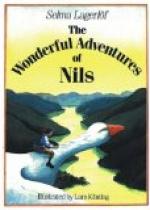“The girl stayed with the boy for the rest of her life, and never again did she long for the valleys. And you, Osa, if you were to stay with us only a month, you could never again part from us.”
With these words, Aslak, the Lapp boy, finished his story. Just then his father, Ola Serka, took the pipe from his mouth and rose.
Old Ola understood more Swedish than he was willing to have any one know, and he had overheard his son’s remarks. While he was listening, it had suddenly flashed on him how he should handle this delicate matter of telling Jon Esserson that his daughter had come in search of him.
Ola Serka went down to Lake Luossajaure and had walked a short distance along the strand, when he happened upon a man who sat on a rock fishing.
The fisherman was gray-haired and bent. His eyes blinked wearily and there was something slack and helpless about him. He looked like a man who had tried to carry a burden too heavy for him, or to solve a problem too difficult for him, who had become broken and despondent over his failure.
“You must have had luck with your fishing, Jon, since you’ve been at it all night?” said the mountaineer in Lappish, as he approached.
The fisherman gave a start, then glanced up. The bait on his hook was gone and not a fish lay on the strand beside him. He hastened to rebait the hook and throw out the line. In the meantime the mountaineer squatted on the grass beside him.
“There’s a matter that I wanted to talk over with you,” said Ola. “You know that I had a little daughter who died last winter, and we have always missed her in the tent.”
“Yes, I know,” said the fisherman abruptly, a cloud passing over his face—as though he disliked being reminded of a dead child.
“It’s not worth while to spend one’s life grieving,” said the Laplander.
“I suppose it isn’t.”
“Now I’m thinking of adopting another child. Don’t you think it would be a good idea?”
“That depends on the child, Ola.”
“I will tell you what I know of the girl,” said Ola. Then he told the fisherman that around midsummer-time, two strange children—a boy and a girl—had come to the mines to look for their father, but as their father was away, they had stayed to await his return. While there, the boy had been killed by a blast of rock.
Thereupon Ola gave a beautiful description of how brave the little girl had been, and of how she had won the admiration and sympathy of everyone.
“Is that the girl you want to take into your tent?” asked the fisherman.
“Yes,” returned the Lapp. “When we heard her story we were all deeply touched and said among ourselves that so good a sister would also make a good daughter, and we hoped that she would come to us.”
The fisherman sat quietly thinking a moment. It was plain that he continued the conversation only to please his friend, the Lapp.




